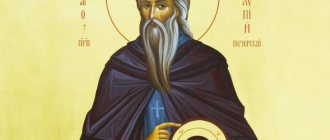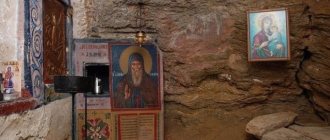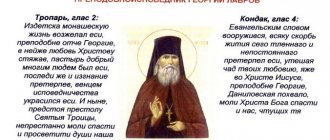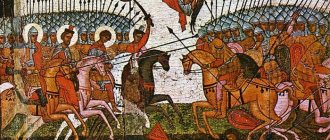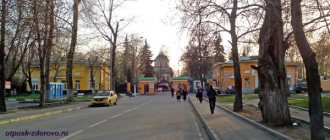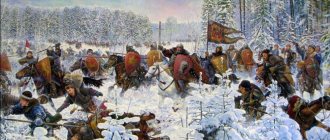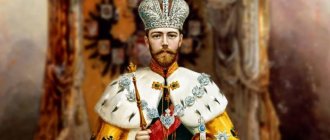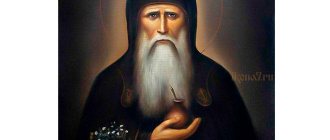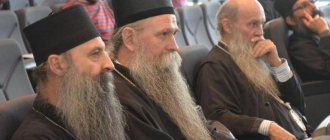| St. Nikola Svyatosha. Engraving, Kyiv, 1661 |
Nikola Svyatosha
(+ 1143), Prince of Chernigov, Pechersk Wonderworker, Venerable Memory October 14, in the Cathedrals of St. fathers of the Kiev-Pechersk Near Caves and all the saints. Fathers of the Kiev-Pechersk, as well as Bryansk, Volyn, Kyiv, Tula and Chernigov saints
In the world, Svyatoslav was the great-grandson of Grand Duke Yaroslav the Wise and the son of Prince David Svyatoslavich of Chernigov. The saint was the Lutsk prince, had a wife and children (his daughter was later married to the Novgorod prince, holy noble Vsevolod-Gabriel.
On February 17, 1106, the holy prince, leaving his family, took monastic vows at the Kiev-Pechersk monastery. Here St. Nicholas the Svyatosha underwent obedience with great humility: for three years he worked in a cookhouse, for which he chopped wood and carried water, and for the next three years he was a gatekeeper at the monastery. The saint planted a garden near his cell. At his own expense, he built a church in the monastery in the name of the Holy Trinity and a hospital church in the name of St. Nicholas, his heavenly patron. Subsequently, this territory was allocated to a separate Trinity Hospital Monastery.
The Monk Nikola became the first of the Russian princes to accept monasticism. He patiently endured the reproaches of his brothers for his determination to lead the life of an unresponsive novice. The saint's doctor, Peter, proved to the ascetic prince that the feat of such obedience would harm his health. But suddenly the doctor himself fell ill and was healed only through the prayers of St. Nicholas. Then Peter took monastic vows.
Having undergone various obediences, St. Nicholas imposed a vow of silence on himself. When the saint received money, he used it to decorate the temple, to buy books (for he loved reading books), or distributed it to the poor. He was a zealous peacemaker. In 1142, he reconciled the Chernigov princes with the Grand Duke Vsevolod.
He died in 1143 and was buried in the Near Caves. Soon after his death, his brother, Prince Izyaslav, became seriously ill. The abbot of the monastery sent the monk's hair shirt to the sick man. Izyaslav put it on and was healed.
Reverend Nikola Svyatosha
“ away ... Dominion passes from nation to nation... The Lord overthrows the thrones of rulers and places the meek in their place ” (1 Cor. 7:31; Sirach 10:8,17). The noble Prince Nikola [1] from his earliest youth understood this fragility of fleeting dominion on earth.
He clearly saw that only in heaven there exists an imperishable, eternally abiding kingdom, filled with those ineffable eternal blessings that the Lord has prepared for those who love Him. Therefore, he - just like the once Indian prince Joasaph [2] - left the glory and wealth, honor and power of his temporary, earthly reign for the sake of the eternal, heavenly kingdom and, having come to the Pechersk monastery, put on the holy monastic order [3].
In monasticism, Blessed Nicholas shone so brightly with the holiness of his life that everyone, seeing his good deeds, zealously glorified the Lord for him. And above all, he excelled in obedience. At first, Saint Nicholas worked for the brethren in a cookery; here he chopped wood with his own hands and humbly carried it from the shore on his shoulders, diligently doing everything else that was necessary for cooking. He had already worked a lot when his brothers Izyaslav and Vladimir learned about his exploits; they began to keep him from such work. But this true novice begged them with tears to allow him to work for the brethren for one more year in the cookery.
And here he served the brethren with full diligence and zeal for three whole years. After this, as a proven man and capable of everything, he was assigned to guard the monastery gates, and in this obedience, without leaving anywhere except the church, he also spent three years. From there he was assigned to serve at the fraternal meal; and he performed this obedience with zeal and such diligence that he enjoyed the favor of all the brethren.
Having thus gracefully passed through all these degrees of obedience, he, with the permission of the abbot and all the brethren, took upon himself the feat of silence in order to take care of his salvation in silence. Fulfilling this obedience, he built a garden at his cell with his own hands, and throughout all the years of his monastic life he was never seen idle; he always had some kind of work in his hands, and on his lips continuously this Jesus prayer: “Lord Jesus Christ, Son of God, have mercy on me!” He never ate anything other than the common monastic food at meals, and then in small quantities. If, against his wishes, as a prince, he had to receive something from those close to him, then he immediately distributed it all to the needs of wanderers, the poor and for church buildings, so that many books were purchased for the church with his funds.
This blessed prince, even during his possession of his principality, had with him a very skilled doctor named Peter, a Syrian by birth, who came with him to the monastery. This doctor, seeing his master’s voluntary poverty, left him and lived in Kyiv, treating many there. However, he repeatedly came to the blessed one and, seeing him in great hardship and immeasurable fasting, serving in the kitchen and as a guard at the monastery gates, he exhorted him to leave this way of life:
“Prince, you should take care of your health so that through excessive labor and abstinence you do not completely weaken your flesh, for if you become exhausted, the yoke that you, for Christ’s sake, wished to take upon yourself will become unbearable for you.” After all, God does not seek fasting or deeds beyond one’s strength, but only a pure and humble heart. You work for the monks like a bought slave; After all, you are not used to such need, and it is unworthy of you, since you are a prince. For your noble brothers Vladimir and Izyaslav, your poverty is sorrow and great humiliation, since from such great glory and honor you have come to such deprivation that you kill your body and, due to insufficient food, fall into illness. You previously ate delicious fruits, but now you have subjected yourself to severe hardships by eating raw herbs and dry bread. But be careful lest you fall completely ill, and then you, having no more strength, will lose your life, and I will not be able to help you; So, you are preparing an inconsolable cry for your brothers. Here are the boyars, who once served you and, thanks to you, were formerly noble - and they, having lost their hopes, regret you and are in great despondency. But they built large houses for themselves and now live in them, but you have no place to lay your head, and you sit next to the garbage heaps, then in the kitchen, then at the gate. Which of the Russian princes did this? Isn’t it already your blessed father David, or your ever-memorable grandfather Svyatoslav? And none of the boyars would have wished for such an inglorious life, except for one Varlaam [4], who was the abbot here.
So, if you do not listen to my advice, you will die prematurely.
The doctor Peter, taught by the brothers of St. Nicholas, often spoke similar words to him when he sat with him either in the kitchen or at the gate.
The blessed one always answered him:
- Brother Peter! Often thinking about the salvation of my soul, I decided that I should not spare the flesh, so that it does not enter into struggle with the spirit and does not arouse warfare in my soul. Tired by the feat of abstinence, she humbles herself, but does not become exhausted; and even if she were weak, then the apostle said: “ My strength is made perfect in weakness ” (2 Cor. 2:5). And again: “ The sufferings of this present time are not worth anything in comparison with the glory that will be revealed in us ” (Rom. 8:12). God desires a humble and pure heart, but it cannot exist without fasting and asceticism, because fasting is the mother of chastity and purity. And it is also said: “ He humbled their hearts with their works ” (Ps. 106:12).
I thank God for freeing me from worldly worries and making me a slave for His servants - these blessed monks; After all, I, being a prince, under the guise of working for them, work for the King of kings. Let my brothers take care of themselves: “ each one will bear his own burden ” (Gal. 6:6). Enough is enough for them of my inheritance, which I left along with my earthly reign in order to receive an inheritance in the kingdom of heaven: “ For Him I have given up everything, and count them as rubbish, in order to gain Christ ” (Phil. 3:8). Why do you threaten me with death, reproach me for my poverty and for abstaining from excessive foods? After all, when you treat a physical illness, don’t you command the patient to be abstinent, and to completely avoid certain foods? And I need to heal mental illnesses in the same way. Even if I die physically, then Christ’s death gain ” (Phil. 1:21). If I’m sitting next to garbage heaps, then why do you consider me worse than the boyars? after all, I must reign with Job, of whom it is said that he was more famous than all the sons of the east (Job 1:3).
If none of the Russian princes did this before me, then I, following the King of Heaven, will make a beginning; maybe from now on someone will imitate me, following my example. Finally, together with those who teach you, I advise you to take more care of yourself!
The following also happened many times. When this blessed prince, tired of the feat of obedience, fell into illness, then the doctor Peter, learning about this, immediately prepared him the medicines needed for this or that illness. But the prince always became healthy before the doctor arrived with medicine, God’s help, and never allowed himself to be treated.
One day the doctor himself had to fall ill. The blessed one sent to him to say:
“If you don’t take medicine, you will soon recover, but if you don’t listen to me, you will suffer for a long time.”
But the doctor did not listen and drank his medicine and, wanting to be cured of the disease, almost lost his life, although he was later healed through the prayer of the saint. When the same doctor soon fell ill again, the blessed one ordered the same message to be conveyed to him:
“If you don’t get treatment, you’ll recover on the third day.”
Having been punished for his first disobedience, this time the doctor obeyed the blessed one and, according to his word, recovered on the third day. Blessed Nicholas at the same time was completing his obedience as a monastery gatekeeper; calling the recovered doctor, he told him:
- Peter! It is appropriate for you to take monastic vows and, instead of me, work in this monastery for the Lord and His Most Pure Mother, because after three months I will depart from this world.
The doctor Peter, hearing this, fell at his feet and cried out, shedding tears:
“Alas for me, my lord, my benefactor, my precious life!” Who will receive me when I come here? Who will feed the orphaned and needy, who will stand up for the downtrodden, who will show mercy to many who require help? Didn’t I tell you, prince, that you would soon bring inconsolable crying to your brothers? Didn’t I tell you: Prince, take care of your life, for you can be useful to many, and in your life - the lives of many people. Didn't you heal me by the power of God and your prayer? Where are you going, good shepherd? If you yourself, my healer, fall ill, then tell me, your servant, about your illness, and if I do not cure you, then let my life and my soul be for your life and for your soul. Do not leave me in silence, my lord, but tell me where did this news come from? If from people, then I will give my life for you, and if the Lord proclaims this to you, then pray to Him that I may die in your place. If you leave me, then where should I sit and cry about my loss, whether at this garbage heap where you so often sat - but they won’t let me in here either. And will I be able to inherit anything from your estate when you yourself are naked? Are these these patched rags that you are wearing? But even in those, when you depart from the world, you will be placed. Grant, at least to me - just as Elijah did to Elisha of old - your prayer, so that I can share with it the depth of my heart and the waters of my life [5] and go to a place of distant shelter, to the house of God, where you now want to go. And the beast, after all, after sunset understands that he needs to go and lie down in his lair, but I don’t know where I will go after your departure. And the bird “ And the bird finds a place for itself, and a swallow finds a nest for itself, where to lay its chicks ” (Ps. 83:4), but you have been living in a monastery for six years and have not found a place for yourself: where will you leave me? Raising the crying doctor, the blessed one said to him: “Peter!” Do not complain: “ It is better to trust in the Lord than to trust in princes ” (Ps. 117:9). The Lord knows how to preserve His creation, which He Himself created. He will take care to feed the hungry, intercede for the poor and save those in trouble, and He will be a refuge for you. Let my brothers according to the flesh cry not about me, but about themselves and about their deeds, in the deplorable vale of this world, in order to receive consolation and bliss in the future. For the sake of temporary life, I do not need healing, because I have long since died for everything temporary: “ The dead will not live ” (Is. 26:14) (speaking by nature), as Isaiah says.
Having said this, blessed Nikola Svyatosha, together with the doctor, went to the cave and prepared a place for his grave there. At the same time, he told the doctor:
-Which of us loves this place more?
Peter answered weeping:
“I know that if you wish, you will pray to the Lord that you may live longer, and put me here.”
The blessed one told him:
“Let it be as you wish, if the Lord so pleases.” So, let us both pray to Him, but only in the monastic rite.
Then, on the advice of the blessed one, the doctor took monastic vows and spent three months in prayer, incessantly, day and night, shedding tears.
One day blessed Nikola said to him:
“Brother Peter, do you want me to take you with me?” He, as before, answered him with tears:
“I wish you would let me die for you, and you stay here and pray for me.”
The blessed one told him:
- Brother, dare and be ready, because, according to your desire, on the third day you will depart from this life.
When the predicted time arrived, Peter, having received the holy and life-giving Mysteries of Christ, lay down on his bed and gave up his spirit in the hands of the Lord. After the death of the doctor, blessed Prince Nikola Svyatosha labored for another thirty years without leaving the monastery and, having achieved, according to his nickname, perfection in a holy life, he reposed in eternal life to the Most Holy of all saints, the King of humility - Jesus [6]. On the day of the death of this holy prince, almost the entire city of Kyiv gathered, giving him the last kiss and asking for his prayers with copious tears.
The brothers of the blessed one, Izyaslav and Vladimir, especially cried. Izyaslav turned to the abbot of the monastery with a request that he give him the cross of the deceased, the pillow and the bench on which he knelt for blessing and consolation. The abbot, giving them to him, said:
- According to your faith, may you receive help from these things in what you desire.
Izyaslav, having received these objects with great reverence, sent a lot of gold to the monastery so that it would not be for nothing that his brother would receive these things.
This same Izyaslav once fell severely ill and did not even hope to get up from his bed. At this time, his wife, children and all the boyars were with him. Some time passed like this; then the patient, having recovered somewhat, stood up and asked to drink water from the Pechersk well. But soon he lost his tongue again and after that he could no longer say anything. They sent it to the Pechersk Monastery and took there in a vessel the water with which they had previously washed the tomb of the Monk Theodosius. The abbot also handed over the hair shirt of St. Nicholas the Svyatosha, so that his body could be dressed in it. And the messenger with water and hair shirt had not yet returned when Prince Izyaslav said:
“Hurry up and go to meet the Reverend Fathers Theodosius and Nikola outside the city.”
When the messenger entered with a hair shirt and water, the prince exclaimed again:
- Nikola, Nikola Svyatosha!
They gave him that water to drink, dressed him in a hair shirt, and he soon became healthy, and everyone glorified God and His saints.
Since then, Izyaslav always put on this hair shirt when he fell ill, and immediately became healthy. In addition, he always had this hair shirt on him when he went to war, and thus remained unharmed. Having sinned once, he did not dare to put it on himself and that time he was killed in the war; however, he ordered in advance to bury himself in it.
So we too, relying on the prayers of this reverend prince, of whose salvation we have obvious news, may we be honored by the power of his prayers to receive healing from all diseases and ulcers, both temporary and eternal - by the grace of the King of humility, and together with the King of glory Our Lord God and Savior Jesus Christ, to Him be glory with God the Father and the Holy Spirit, now and ever, and unto ages of ages. Amen.
Notes:
[1] Svyatoslav Svyatosha (so named for his piety) was called Pankratiy at baptism, and Nikolai in monasticism. He was the son of the Chernigov prince David Svyatoslavich and the grandson of the Kyiv and Chernigov prince Svyatoslav Yaroslavich, who founded the holy Pechersk Church, created by God.
[2] His memory is November 19. He was the son of the Indian king Abner; his memory at the same time.
[3] This was in 1107.
[4] Varlaam was the first abbot of the Kiev-Pechersk Monastery; he was the son of the first Kyiv boyar John; his memory is November 19
[5] That is, to dispel heartache and sadness in life. The expression was taken to correspond with the well-known story from the life of the prophet Elisha.
[6] It was October 14, 1143. The relics of St. St. Nicholas the Saint rests incorruptibly in the cave of St. Anthony.
Life as presented by St. Demetrius of Rostov
Links
| Nikolai Svyatosha on Wikisource |
- Nikolai Svyatosha // Encyclopedic Dictionary of Brockhaus and Efron: in 86 volumes (82 volumes and 4 additional). - St. Petersburg, 1890-1907.
Hieromartyrs Kuksha Pechersky • Onisim (Pylaev) • Peter (Pavlushkov) • Nikita (Pribytkov) Martyrs Mikhail Vsevolodovich Reverends Nikola Svyatosha • Alexander Peresvet • Andrey Oslyabya • Makary Zhabynsky Saints Nicholas of Mirlikiy • Theoktist of Pechersky • Pimen (Black) The faithful Princes Boris and Gleb • Igor Olgovich • Alexander Nevsky • John Kalita • Dimitri Donskoy other Schema nun Sophia
